Summer is here and it isn’t showing any signs of slowing down. The insistent heat may leave you feeling exhausted of all energy even before you start your day or till you get into your car and turn the air-con on. But remember, just as the heat affects your efficiency, it puts your vehicle through enormous stress and strain. In slow-moving traffic, the temperature in and around the car could shoot up to 60 degrees centigrade; an unbearable space for your vehicle to be in. In the long run, such intensity could only damage and speed up the aging process of your car.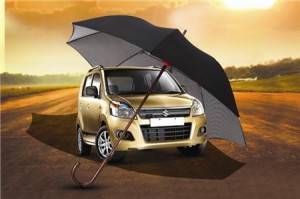
You have ways which could offer you a breather from the heat. Similarly, it is very important to help your car deal with the sweltering temperature. Most of the steps can be handled at service centres or by authorised dealers. Given the volume of cars coming in to these centres, it is not necessary that the dealers give your car the attention it requires. We suggest you drive down to an independent garage and be involved in the processes that make your car summer-ready.
A few areas that require undivided attention are listed below
TYRES
Tyres are one of the most uncared for parts of a car. Often, vehicle owners forget to check the tyre pressure regularly and in fact, some owners aren’t even aware of the recommended levels. This is particularly catastrophic for summer, when poor inflation can push a car’s tyres to destruction in a very short time.
Running on low on a hot day, for one, could destroy your sidewall, the softer rubber being more prone to damage. On poor roads, this could even result in the tyres bursting. This is due to the excessive flexing or ‘pumping’ of the side wall of a soft tyre; it heats up just like the outside of a cycle pump and this causes the rubber inside to get soft, elastic and easy for the air to ‘tear’ through. So, during summer, make sure you increase pressure by 3-5psi and pay attention to your tyres.
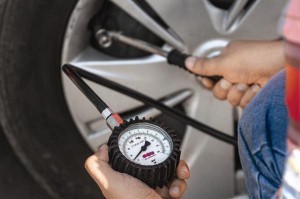 What’s also important to remember is that tyre pressure changes according to the outside temperature. It decreases by approximately 1psi for every 10-degree drop in temperature. As the tyre heats up over the course of the day, it affects the air inside the tyre which expands when heated during normal running. It is best to check the tyre pressure early in the morning when it is comparatively cooler to get the correct reading and once every two weeks.
What’s also important to remember is that tyre pressure changes according to the outside temperature. It decreases by approximately 1psi for every 10-degree drop in temperature. As the tyre heats up over the course of the day, it affects the air inside the tyre which expands when heated during normal running. It is best to check the tyre pressure early in the morning when it is comparatively cooler to get the correct reading and once every two weeks.
Also, the tyre pressure needs to be attuned according to road conditions and vehicle load. For example, a vehicle that is carrying a full complement of passengers and luggage will require a higher tyre pressure than one with just two occupants.
Do not forget to check the condition and air pressure of the spare tyre as well especially since it could turn out to be a life saver on a scorching summer day. Also, get the tyres correctly aligned and balanced to avoid unnecessary tyre wear.
Air-conditioning
During the summer months, a car’s AC is the feature that takes the most load. Now air-conditioning systems, as we all know, are service intensive. The compressor oil needs to be topped up regularly to help protect the unit, there are regular coolant leaks and dust and dirt can cause the system to overload and malfunction. Hence, get the AC unit checked by a qualified technician before the onset of summer.
One common grievance from car owners during summer is that the AC takes too long to cool down the cabin. Irrespective of how powerful the AC unit is, it ends up taking time due to the heat trapped in the car. 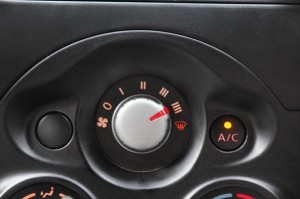 If your car remains parked under direct sunlight during the day, the interior temperatures could exceed the outside temperature by around ten degrees or even more. So, once you enter the car, roll down the windows first to let the heat escape. Then, switch on the AC at the highest fan setting and wait for a couple of minutes. Roll up the windows once you feel that the car’s interior and the outside temperature have reached similar levels.
If your car remains parked under direct sunlight during the day, the interior temperatures could exceed the outside temperature by around ten degrees or even more. So, once you enter the car, roll down the windows first to let the heat escape. Then, switch on the AC at the highest fan setting and wait for a couple of minutes. Roll up the windows once you feel that the car’s interior and the outside temperature have reached similar levels.
By following this method, you can significantly reduce the amount of time taken by the AC to cool down the cabin. Also, before leaving the car in parking, you can keep the windows rolled down by around half an inch to prevent the heat build-up.
Radiator and fluids
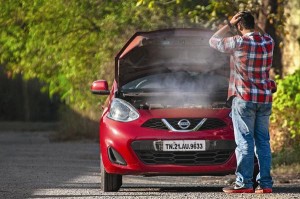 A good quality coolant is one of the most important fluids your car needs in summer. In fact, one of the most common causes of vehicles breaking down during summer is the engine overheating owing to low coolant levels. So, before summer, check the coolant level and top it up if it’s low. If your car is more than three years old, get the radiator serviced before summer, and while you are at it, check for any leaks. Also make sure you use the correct coolant. Using a cheaper one may seem attractive, but it may prove to be penny wise here.
A good quality coolant is one of the most important fluids your car needs in summer. In fact, one of the most common causes of vehicles breaking down during summer is the engine overheating owing to low coolant levels. So, before summer, check the coolant level and top it up if it’s low. If your car is more than three years old, get the radiator serviced before summer, and while you are at it, check for any leaks. Also make sure you use the correct coolant. Using a cheaper one may seem attractive, but it may prove to be penny wise here.
Engine, transmission oil
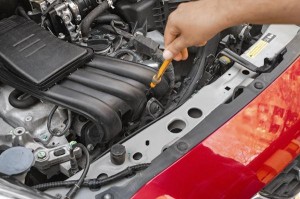 Nothing destroys engine oil faster than high temperatures. This is especially true if your car is using oil that is already semi-destroyed and old. So, check the engine oil level and get it topped up with the right oil. On the other hand, you could also drain the engine oil and use a more heat resistant grade which will retain its viscosity and reduce wear and tear under extreme operating conditions. Also get the fluid levels of the power steering, brake and transmission units checked, as these could be a weak link.
Nothing destroys engine oil faster than high temperatures. This is especially true if your car is using oil that is already semi-destroyed and old. So, check the engine oil level and get it topped up with the right oil. On the other hand, you could also drain the engine oil and use a more heat resistant grade which will retain its viscosity and reduce wear and tear under extreme operating conditions. Also get the fluid levels of the power steering, brake and transmission units checked, as these could be a weak link.
Hoses and belts
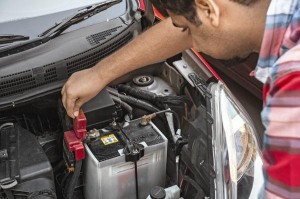 While a car is being driven, the engine bay reaches very high temperatures. It is important to swap parts once they reach a particular level of wear and tear, else they won’t be able to endure the high operating temperatures. Parts like hoses and belts suffer under these circumstances as they are made from rubber compounds. And once something like a rubber hose gets hard, it’s only a matter of time before it ruptures. So, a physical check is really useful in this case. Check all clamps and clips as well and remember, a loose clamp can be due to a regular pressure build up.
While a car is being driven, the engine bay reaches very high temperatures. It is important to swap parts once they reach a particular level of wear and tear, else they won’t be able to endure the high operating temperatures. Parts like hoses and belts suffer under these circumstances as they are made from rubber compounds. And once something like a rubber hose gets hard, it’s only a matter of time before it ruptures. So, a physical check is really useful in this case. Check all clamps and clips as well and remember, a loose clamp can be due to a regular pressure build up.
Battery
Excessive heat ends up reducing battery life by causing the fluid inside it to evaporate at a faster rate. It even speeds up the chemical reaction inside a battery, leading to overcharging. Get the battery checked to find out if it’s charging at the correct rate. Also, check for any rust on the battery terminals, ensure they are free of dirt and whether all cable connections are secure. Most new cars come equipped with zero-maintenance batteries. If your car is running a battery that needs to be topped off with distilled water, then check for fluid levels regularly, more so during summer.
Polish and protect
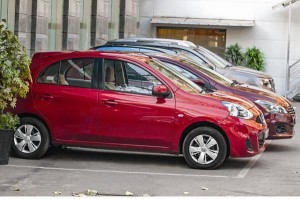 We normally relate a good coat of wax or polish as something that has only a cosmetic benefit. This is incorrect as a good polish will go a long way in protecting your car’s paint from heating up excessively. This is because it forms a layer of protective wax on the paint that reflects a significant portion of the sun’s heat. So, get your car polished before summer and if you can, try and select a polish that adds a layer of protection to your paint as well.
We normally relate a good coat of wax or polish as something that has only a cosmetic benefit. This is incorrect as a good polish will go a long way in protecting your car’s paint from heating up excessively. This is because it forms a layer of protective wax on the paint that reflects a significant portion of the sun’s heat. So, get your car polished before summer and if you can, try and select a polish that adds a layer of protection to your paint as well.
In certain parts of our country, temperatures can rise to as high as 45 degrees during the day. Extreme heat ends up taking a toll on vehicles. Apart from causing the plastic and rubber components to crack, it can also make the fluids work harder at keeping the engine cool. By checking the bits mentioned above and following our tips, you will be able to breeze through a hot summer.
Source Autocar India

